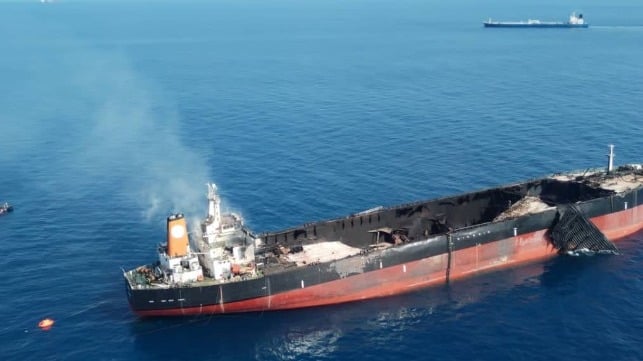EU Sanctions Operator of the Comoros and Gabon Flag Registries

The European Union and the UK have sanctioned a UAE-based company that operates two different flag registries used by the Russian "shadow fleet," the flags of Gabon and Comoros. Whether or not the designation affects the operations of anonymous, Russia-facing tanker operators, it shines a light on the commercial arrangements that enable Russian oil exports.
The company, Intershipping Services LLC, is headquartered in a modern condominium tower in a suburb of Dubai. Both of the flag registries it markets are associated with sanctions evasion, and Gabon has been particularly active since the invasion of Ukraine. The Gabon registry absorbed many of the Russia-linked ships that had become a liability for other registries, including a large share of the Sovcomflot fleet. In 2024, the influx of Russian tonnage made Gabon the fastest-growing shipping register in the world. Gabon was also the flag state of the infamous Iran-linked tanker Pablo, which blew up off Malaysia in 2023.
According to the EU, Intershipping Services LLC also operates the Comoros registry, acting through its owner's family relationships and a subsidiary office located in Mumbai. Comoros has flagged vessels that evade G7 sanctions and transport Russian crude oil, and it is also well-known in enforcement circles. It is on the Paris MOU's black list for frequent vessel detentions, is considered "high risk" by the U.S. Coast Guard, and is one of the three most commonly-encountered flags in crew-abandonment cases, according to the ITF. Comoros also ranks high on the list of flag states for vessels linked to Iranian oil-trafficking, according to United Against a Nuclear Iran (UANI).
Since shadow fleet vessels can be found on the Gabon and Comoros registers, the high-risk shipping practices of questionable tanker operators can too, the EU said. These practices include buying inadequate insurance, engaging in AIS manipulation, and evading safety regulations through opaque corporate structures.
According to Allianz, the global list of shadow fleet tankers serving sanctioned states - Iran, Russia and Venezuela - now stands at about 17 percent of all global tanker tonnage. Russia has driven the explosive growth of the fleet, and now uses more than 300 less-regulated tankers to move its oil to clients in India and China.
"They’re essentially like a tumor on the global shipping system," Elisabeth Braw, a senior fellow at the Atlantic Council, told Marketplace.
